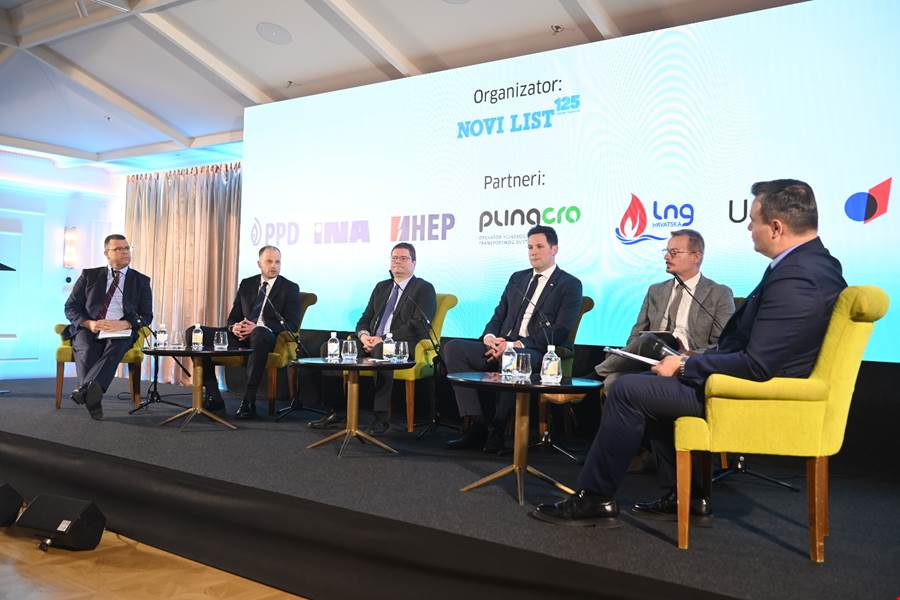Slaven Rajman at the “Kvarner 2030. Energy Hub of the European Union” Conference
Panel discussion participants concluded that fossil fuels will remain an important part of the energy mix for a long time to come, with a significant share, but they also emphasized the importance of developing new technologies and investing in renewable energy sources, efficiency, and security of energy supply from all available sources.
15.04.2025.
Zagreb, April 15, 2025 – Slaven Rajman, a member of the PPD Management Board, participated on April 10, 2025, in the Novi list conference entitled “Kvarner 2030. Energy Hub of the European Union.” The conference was held at the Amadria Park Hotel Milenij in Opatija, organized by Novi list. Slaven Rajman participated in a panel discussion titled “Energy Security and Sustainable Development: LNG, Gas, Solar Systems, and Investment Opportunities for Kvarner and the European Energy System.” Alongside Rajman, the panel also included Vedran Špehar, State Secretary at the Ministry of Economy responsible for energy, industry, mining, and commodity reserves; Robert Bošnjak, Assistant to the Management Board Member of Plinacro; Hrvoje Matković, Director of Sustainable Solutions at INA; and Lado Kranjčević, Dean of the Faculty of Engineering at the University of Rijeka.
The panel discussed the current situation on the energy market, fossil fuels, the expansion of LNG terminal capacities, renewable sources and decarbonization, and energy communities.
The panel began with the current topic of US tariffs and the consequences of their introduction on the global energy market, as well as the US insistence on its trading partners buying larger quantities of American energy. Slaven Rajman pointed out that the European Union already buys fifty percent of the total US exports of liquefied natural gas.
"This also means that the US largely depends on Europe for the export of its gas, so it is no coincidence that energy products are exempt from tariffs. The introduction of tariffs on energy imports into the EU would deal too great a blow to the energy market. On the other hand, we see that LNG that China imported is now being redirected, so there is more of it on the world market, and gas prices have fallen.
Also, in anticipation of a recession and a fall in industrial production at the global level, the price of oil is falling, and with it the price of gas, which is directly linked to the price of oil. It is worth emphasizing that nothing too significant has happened yet; the market reacted to the announcement of tariffs, and we will see what happens later," said Rajman. One of the topics on the panel was also the gas supply routes, which have changed significantly due to the war in Ukraine.
"This primarily refers to the construction of the mentioned gas pipelines, worth 533 million euros. We also have prepared projects for the expansion of capacities towards Slovenia, for transport towards Germany and Austria, as well as towards Hungary, through which six billion cubic meters could be transported annually, along with the gas pipeline project towards Bosnia and Herzegovina. So, we are ready for new capacity increases as well," said Robert Bošnjak.
With the expansion of transport capacities, Croatia would be in a good position to provide gas supply to Ukraine, which is a huge market. "They now consume over 22 billion cubic meters of gas, and in peacetime conditions, more than 30 billion. Their production is around 19 billion annually, so they need additional quantities from imports. In order to be able to supply Ukraine, interconnections with Hungary are needed, which have already been mentioned," added Rajman.
In conclusion of the panel discussion, the panelists agreed that fossil fuels will remain present in the energy mix for a long time to come, and with a significant share, which is why companies like INA, PPD, and Plinacro will continue with investments and business in that sector. However, the importance of developing new technologies and investing in renewable sources, efficiency, and security of energy supply from all available sources was also emphasized. You can read more about the “Kvarner 2030. Energy Hub of the European Union” conference at the link.

